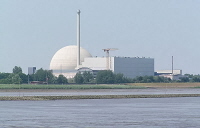German carbon dioxide emissions rose slightly in 2012 as the replacement of politically closed nuclear generation cost the country the opportunity to reduce emissions to a record low.
 |
| The Unterweser nuclear power plant. With a capacity of 1345 MWe and lifetime loadfactor of 79.4%, it might have generated 9.3 TWh for Germany in 2012. Instead, this constant supply was met by a mix of other sources. |
Preliminary greenhouse gas emissions for 2012 have been released by the Ministry of Environment, Nature Conservation and Nuclear Safety. They show an increase in releases of 1.6% to 931 million tonnes of carbon dioxide equivalent per year. One factor in the year's data was cold weather, which led to more use of natural gas in the heating of homes. In electricity generation, the use of coal went up, while increase in wind and solar power resulting from the country's Energiewende reduced the need for natural gas. Nuclear generation was down, thanks to the politically motivated shutdown of eight units following the Fukushima accident of March 2011.
The country's economic output in 2012 grew by 0.2%, according to an estimate from the International Monetary Fund, meaning the 1.6% rise in emissions represented a small increase in carbon intensity for the economy as a whole. Official announcements noted that the German steel and chemical industries had both seen a decline in production during 2012.
Overall, Germany has comfortably met its Kyoto Protocol targets, coming in 192 million tonnes of CO2 per year under its target by the commitment date in 2012. Since 2009 the country's annual emissions have oscillated between 912 and 944 million tonnes. Despite anti-nuclear politics, nuclear power still represents 16% of German electricity.
The lost generation
The effect of the nuclear shutdown was not obvious in the figures thanks to the ramp-up of renewables, which offset the burning of fossil fuels. However, the eight shut down reactors would have generated about 40.2 TWh in 2012 if they had operated in line with performance up to their closure. Replacing this generation would have resulted in an extra 18-34 million tonnes of carbon dioxide emissions compared to that expected from the nuclear lifecycle, representing an opportunity to avoid carbon dioxide emissions that would have easily outweighed the 14 million tonne increase that was recorded - and could have reduced Germany's emissions to an all-time low of 897 million tonnes per year.
Researched and written
by World Nuclear News







_97013.jpg)






